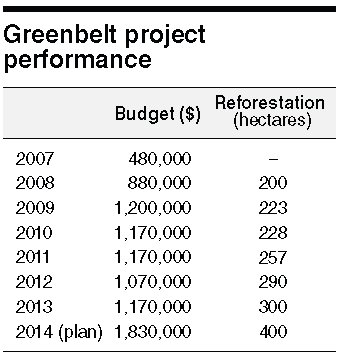The Korea-Mongolia Greenbelt Forestation Project aims to plant some 3,000 hectares of trees to combat drought and desertification in Mongolia.
The state-run Korea Forest Service signed a memorandum of understanding with the Ministry of Environment and Green Development of Mongolia in July 2006 as part of efforts to support the Mongolian government’s 30-year Greenbelt program, which aims to make the landlocked country greener.
The move followed former President Roh Moo-hyun’s visit to Mongolia to expand economic ties in May of the same year.

In March 2007, the Korea Forest Service mapped out a 10-year plan to invest 13.8 billion won ($13.4 million) to help reduce the damage from yellow dust and desertification in Mongolia.
“The project aims to plant some 3,000 hectares of trees by 2016 in Mongolia,” said Choi Young-tae, a director of the Korea Forest Service’s international cooperation division.
“We have so far spent 7.4 billion won in planting 1,498 hectares of trees including local trees named saxaul in the Lun Som and Dalanzadgad areas,” he added.
The Korea Forest Service also runs plant nurseries in which saplings are grown until they reach a usable size in order to carry out more efficient forestation projects in Mongolia.
The nurseries contain greenhouses, seed storehouses and compost depots.
The South Korean government is also working to provide its forestation know-how to Mongolian officials.
From 2009, they have run a training center to foster specialists in forestation technology. A total of 60 Mongolian officials have received related training in both Korea and Mongolia.
As part of efforts to boost Mongolia’s capacity, some of Korea’s forestation projects have begun to be transferred to the Mongolian government from this year to give them more direct control over the projects.
The Korea Forest Service will continue to support its Mongolian counterpart by helping it monitor joint forestation projects and provide consulting services.
Improving the capabilities of local Mongolian residents is important too, said the Korean official.
The Korea Forest Service plans to build follow-up management and training systems for local residents so that they can cultivate crops within the forestation areas.
Both governments are also doing joint research projects in related areas including the selection of tree species for plantation, irrigation tests, soil improvement and the selection of drought-resistant grass.
“With our management skills and expertise, we aim to make this project a best practice in combating desertification,” Choi said.
By Shin Ji-hye (shinjh@heraldcorp.com)
The state-run Korea Forest Service signed a memorandum of understanding with the Ministry of Environment and Green Development of Mongolia in July 2006 as part of efforts to support the Mongolian government’s 30-year Greenbelt program, which aims to make the landlocked country greener.
The move followed former President Roh Moo-hyun’s visit to Mongolia to expand economic ties in May of the same year.

In March 2007, the Korea Forest Service mapped out a 10-year plan to invest 13.8 billion won ($13.4 million) to help reduce the damage from yellow dust and desertification in Mongolia.
“The project aims to plant some 3,000 hectares of trees by 2016 in Mongolia,” said Choi Young-tae, a director of the Korea Forest Service’s international cooperation division.
“We have so far spent 7.4 billion won in planting 1,498 hectares of trees including local trees named saxaul in the Lun Som and Dalanzadgad areas,” he added.
The Korea Forest Service also runs plant nurseries in which saplings are grown until they reach a usable size in order to carry out more efficient forestation projects in Mongolia.
The nurseries contain greenhouses, seed storehouses and compost depots.
The South Korean government is also working to provide its forestation know-how to Mongolian officials.
From 2009, they have run a training center to foster specialists in forestation technology. A total of 60 Mongolian officials have received related training in both Korea and Mongolia.
As part of efforts to boost Mongolia’s capacity, some of Korea’s forestation projects have begun to be transferred to the Mongolian government from this year to give them more direct control over the projects.
The Korea Forest Service will continue to support its Mongolian counterpart by helping it monitor joint forestation projects and provide consulting services.
Improving the capabilities of local Mongolian residents is important too, said the Korean official.
The Korea Forest Service plans to build follow-up management and training systems for local residents so that they can cultivate crops within the forestation areas.
Both governments are also doing joint research projects in related areas including the selection of tree species for plantation, irrigation tests, soil improvement and the selection of drought-resistant grass.
“With our management skills and expertise, we aim to make this project a best practice in combating desertification,” Choi said.
By Shin Ji-hye (shinjh@heraldcorp.com)








![[KH Explains] How should Korea adjust its trade defenses against Chinese EVs?](http://res.heraldm.com/phpwas/restmb_idxmake.php?idx=644&simg=/content/image/2024/04/15/20240415050562_0.jpg&u=20240415144419)











![[Today’s K-pop] Stray Kids to return soon: report](http://res.heraldm.com/phpwas/restmb_idxmake.php?idx=642&simg=/content/image/2024/04/16/20240416050713_0.jpg&u=)